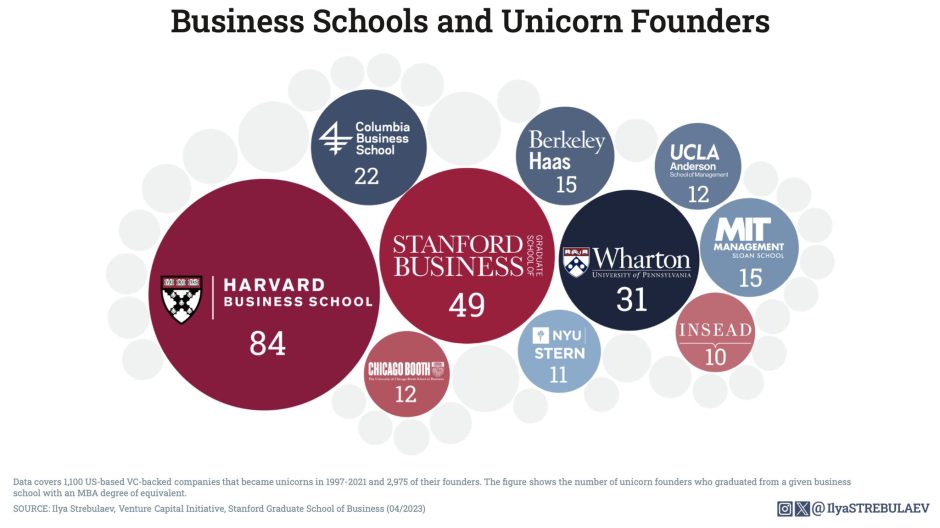Every aspiring entrepreneur asks at some point: Do I need an MBA to build a successful startup?
Some of the biggest founders in tech—Elon Musk, Mark Zuckerberg, and Jeff Bezos—skipped the MBA route and still built billion-dollar companies. However, a Stanford study by Professor Ilya Strebulaev reveals an interesting trend:
Out of 2,975 unicorn founders (startup founders who built billion-dollar companies), 424 (14%) have an MBA. While this isn’t the majority, what stands out is that most MBA unicorn founders come from just a handful of elite business schools.
The MBA Unicorn Pipeline: Which Business Schools Dominate?
According to the Venture Capital Initiative at Stanford Graduate School of Business, only 112 business schools worldwide have produced at least one unicorn founder. However, just six schools account for more than half of all MBA unicorn founders:
- Harvard Business School – 84 unicorn founders
- Stanford Graduate School of Business – 49 unicorn founders
- Wharton (University of Pennsylvania) – 31 unicorn founders
- Columbia Business School – 22 unicorn founders
- MIT Sloan School of Management – 15 unicorn founders
- Berkeley Haas School of Business – 15 unicorn founders
Other schools that made the list include Chicago Booth (12), UCLA Anderson (12), NYU Stern (11), and INSEAD (10).
These numbers suggest that while an MBA isn’t required for startup success, elite business schools offer key advantages—strong networks, investor connections, and access to valuable mentorship.
Do MBA Graduates Have an Advantage in Startups?
While many successful founders never pursued an MBA, those who do often benefit from:
- Powerful Alumni Networks – Access to investors, mentors, and fellow startup founders.
- Easier Access to Venture Capital – Many top VCs actively recruit from MBA programs.
- Strategic Business Knowledge – Learning how to scale, fundraise, and manage growth.
- Credibility with Investors – Some VCs prefer investing in founders with formal business training.
However, an MBA isn’t a guarantee for success. Many entrepreneurs build thriving startups without one, relying instead on real-world experience, mentorship, and a strong professional network.
Should You Get an MBA for Startup Success?
An MBA can be a great tool if leveraged correctly—but it’s also expensive and time-consuming.
If you already have industry experience, a strong network and access to capital, then skipping business school and focusing on execution might be a better move.
However, if you’re looking for structured learning, networking opportunities and access to venture capital, then an MBA from a top-tier business school could provide a strong competitive advantage.
Is an MBA Worth It for Startup Founders?
At the end of the day, success in startups isn’t about where you studied—it’s about execution, resilience, and the ability to solve real problems.
That said, if you want access to investors, mentors, and a solid business foundation, an MBA from a top business school could increase your chances of building a billion-dollar startup.
While an MBA can provide valuable knowledge and networking opportunities for startup founders, securing the right funding is just as critical for success. Choosing between SAFE notes, convertible notes, and equity can significantly impact your startup’s future. If you’re navigating early-stage fundraising, check out our in-depth guide on the best startup funding model—SAFE, convertible notes, or equity to make an informed decision.”
Source: Ilya Strebulaev, Venture Capital Initiative, Stanford Graduate School of Business (2023).




